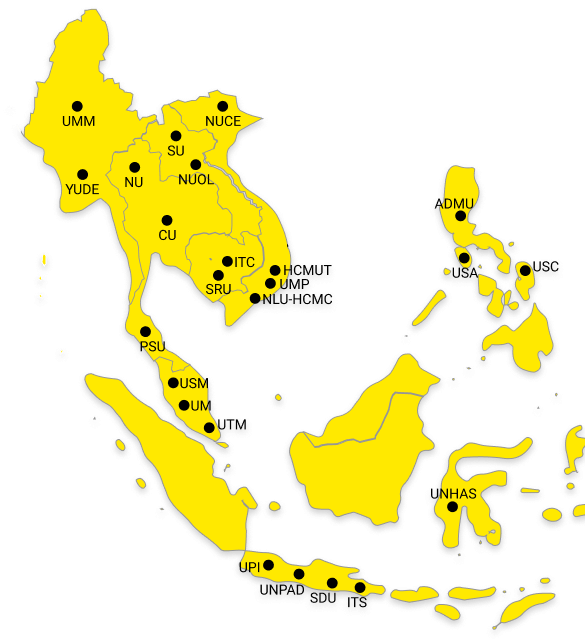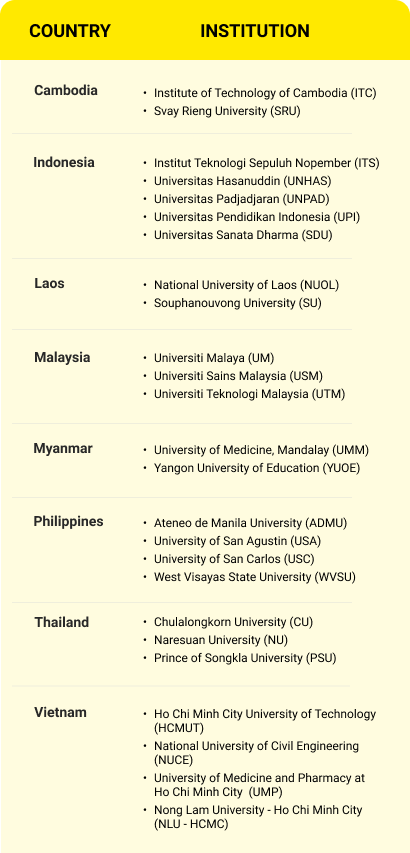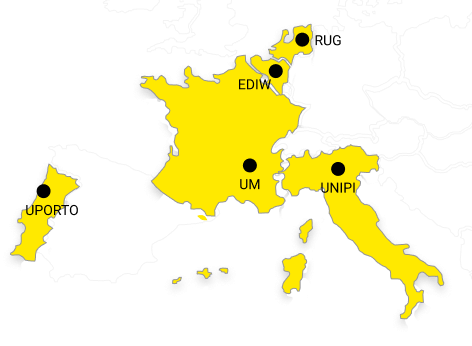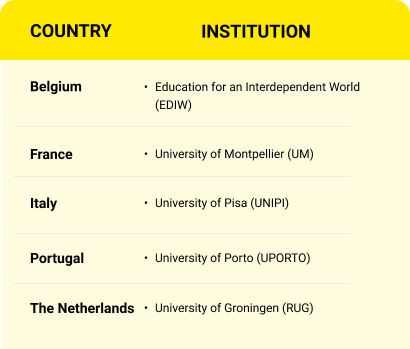Consortium
The CALOHEA project unites thirty-one institutions across eight countries within ASEAN and
five countries within Europe. The universities in the SEA Region have created institutional
teams that together form Subject Area Groups in the fields of Civil Engineering, Medicine and
Teacher Education. More information on participating HEIs, the institutional teams and
the SAGs can be found in the menu here underneath.
The CALOHEA project unites thirty-one institutions across eight countries within ASEAN and five countries within Europe. The universities in the SEA Region have created institutional teams that together form Subject Area Groups in the fields of Civil Engineering, Medicine and Teacher Education. More information on participating HEIs, the institutional teams and the SAGs can be found in the menu here underneath.
CALOHEA Institutional Teams
Composed of 5 to 8 individual members, these teams are working on the 3 Recognition Mechanisms at the degree
programme, institutional and regional levels.
As Soon As The Teams Are Formed, The Information Will Be Updated Here
SUBJECT AREA GROUP COORDINATORS
Each Subject Area Group (SAG) is led by a Coordinator and Co-Coordinator.
Civil Engineering






















Add Your Heading Text Here
Universiti Sains Malaysia






















Add Your Heading Text Here
Ho Chi Minh City University of Technology
Medicine






















Add Your Heading Text Here
Universiti Sains Malaysia






















Add Your Heading Text Here
Universitas Padjadjaran






















Add Your Heading Text Here
Vice Rector for Collaborations
Sanata Dharma University






















Add Your Heading Text Here
Associate Professor at the School of Education
University of San Carlos
Teacher Education
Southeast Asia




Europe





Southeast Asia



Europe



The Steering Committee consists of one
representative of each CALOHEA Partner
Institution and is responsible for the timely
execution of project activities.
The Steering Committee consists of one representative of each CALOHEA Partner
Institution and is responsible for the timely execution of project activities.
Chaired by the AUN, the Dissemination Board consists of at least one representative per Partner Country and is responsible for the project Dissemination and Exploitation activities.
The Dissemination Board is composed of 12 members, who are:
- Dr. Han Virak, Institute of Technology of Cambodia, Cambodia
- Data Iranata, ST, MT, Ph.D., Institut Teknologi Sepuluh Nopember, Indonesia
- Dr. Vanessa Gaffar, SE.Ak. MBA, Universitas Pendidikan Indonesia, Indonesia
- Dr. Ir. Prastawa Budi, Msc, Universitas Hasanuddin, Indonesia
- Mr. Amkheng Phenglasy, National University of Laos, Lao PDR
- Dr. Hong Wei-Han, Universiti Malaya, Malaysia
- Prof. Dr. Hamdan Bin Said, Universiti Teknologi Malaysia, Malaysia
- Remi Charlene Salvilla, RPh, MSPhar, PhD, University of San Agustin, the Philippines
- Assoc. Prof. Dr. Jumela Sarmiento, Ateneo de Manila University, the Philippines
- Penvara Xupravati, Ph.D., Chulalongkorn University, Thailand
- Vu Tran Thien Quan, PhD, University of Medicine and Pharmacy at Ho Chi Minh City, Vietnam
- Mr. Bruce NGHIEM Ha Tan, Hanoi University of Civil Engineering, Vietnam
Chaired by the AUN, the Dissemination Board consists of at least one representative per Partner Country and is responsible for the project Dissemination and Exploitation activities.
The Quality Assurance Board is responsible for
the development and timely execution of the
Quality Assurance and Monitoring Plan.
The Quality Assurance Board is responsible for the development and timely execution of the Quality Assurance and Monitoring Plan.
The University of Groningen (RUG) is the project coordinator. The RUG is responsible for the academic activities related to the adoption of the 3 Recognition Mechanisms, as well as the management of the project.
The ASEAN University Network (AUN) acts as coordinator within the SEA region. The AUN has a leading role in all of the National Meetings. Besides, the AUN leads dissemination activities, engages key stakeholders such as policymakers in the Region and ensures that the CALOHEA project is in line with national and regional policies of the Partner Countries involved.
